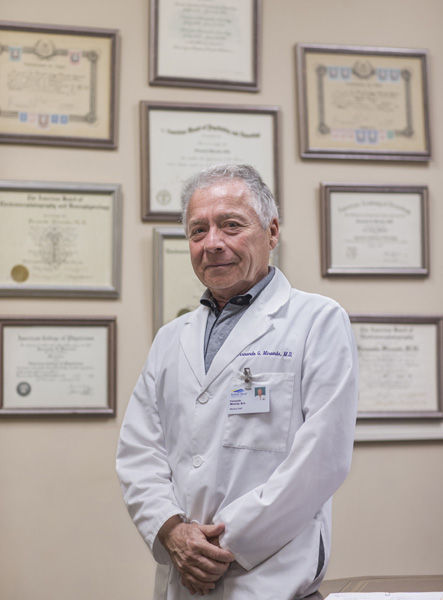Most people have a picture in their heads of what an epileptic seizure looks like – a person falling to the ground, jerking uncontrollably. It is frightening image and the main reason why people with this disease were in the past feared and ostracized. But in fact epileptic seizures can manifest in other ways and having a seizure doesn’t necessarily mean a person has epilepsy – that diagnosis is made only if there have been two or more seizures not triggered by an underlying medical condition.
Fernando Miranda, M.D., is an internationally recognized cognitive and behavioral neurologist with practices in San Francisco and Vero Beach. He says, “There are two main types of seizures – partial and generalized.” In partial seizures, the abnormal activity is limited to one area of the brain. Generalized seizures involve an electrical discharge in both sides of the brain. “The medication used to treat the disorder depends on the type of seizure the patient experiences,” Dr. Miranda says.
The symptoms of seizures vary based on the type and intensity, and can include:
- Temporary confusion
- Tingling, dizziness, seeing flashing lights
- Changes in hearing, sight, taste, smell, and touch
- Jerking and twitching of limbs
- Change in awareness, including staring and repetitive movements
- Psychic symptoms, such as feelings of fear, anxiety, or déjà vu
- Loss of consciousness
There can be warning signals before some seizures (for example headache, weakness, sleepiness, falling). Other seizures, typically of the generalized type, tend to occur suddenly and without warning.
As epilepsy is caused by abnormal brain cell activity, it can affect any process coordinated by the brain. The symptoms vary based on the extent of the abnormal activity, but people with epilepsy typically experience the same symptoms each time they have an episode.
Dr. Miranda says that 80 percent of seizures will respond to one medication alone. The remaining 20 percent of patients will be put on two medications, and 80 percent of them will respond. “So, if you have 100 patients, 80 of them will respond to one medication, 16 will respond to two medications; the remaining 4 patients will respond to a combination of 3 medications, or not all, ” he says.
“All seizure medication can affect cognitive function,” Dr. Miranda says. “The medicine goes to all nerve cells, not just sick ones.” Regardless, Dr. Miranda is a strong advocate of patients taking their medication as prescribed; he says, “A person with epilepsy can never foretell if they are going to have a seizure.”
An obvious worse-case scenario is having a seizure while driving, but Dr. Miranda also talked about riding a bike. “If not controlled by medication, a seizure can come on when exercising,” he says. “Whether or not the seizures are controlled, I always tell my patients to wear a helmet when biking.” This advice also applies when skiing, riding a motorcycle, or undertaking any other high-risk activity.
Epilepsy is most commonly diagnosed in early childhood or after the age of 60. Approximately 4 percent of people in the United States will be diagnosed with epilepsy at some point in their lives. In about half of epilepsy cases, the cause is unknown; but the other half can be traced to various risk factors, including:
- Genetic influence. Some types of seizures can run in families, as there is a genetic influence on the part of the brain that is affected.
- Prenatal injury. Such injuries can include infection in the mother, poor nutrition, and oxygen deficiencies.
- Seizures in childhood. High fevers in childhood are sometimes associated with the development of a seizure disorder later in life.
- Brain conditions. Brain tumors can cause epilepsy, and stroke is one of the leading causes of epilepsy in adults over the age of 35.
- Infectious diseases. Epilepsy can be caused by meningitis, AIDS, and viral encephalitis.
- Head injuries. Hence the helmet directive! Also, of course, wear a seat belt when driving or riding in a car.
There is also a link between epilepsy and autism. It is estimated that as many as 33 percent of children with autism spectrum disorder also have epilepsy. Some seizures are not classified as epilepsy, so the actual number of autistic children who have seizures is actually higher; about 70 percent, according to Dr. Miranda. He says, “The theory is that there are nerve cells in the brain that are faulty from birth.” Children with epilepsy are also more likely to be diagnosed with ADHD; Dr. Miranda says, “Both are brain issues, not mind issues.”
The January 2015 journal “Neurology” published a study that said sleeping in a prone position – on the stomach – results in a much higher incidence of Sudden Unexpected Death in Epilepsy (SUDEP). We asked Dr. Miranda about this, he said, “I read it. It was interesting. And I agree it’s true.” He said, “One possible reason is that the seizure could cause acid reflux, which could lead to cardiac arrest.”
“Epilepsy is complex thing,” Dr. Miranda says. Patients should be taken care of by a neurologist. We see more cases that primary care physicians do, and we can provide more options.”
Dr. Miranda’s Vero Beach office is located at 920 37th Place, #104; the office phone is 772-299-4730.

